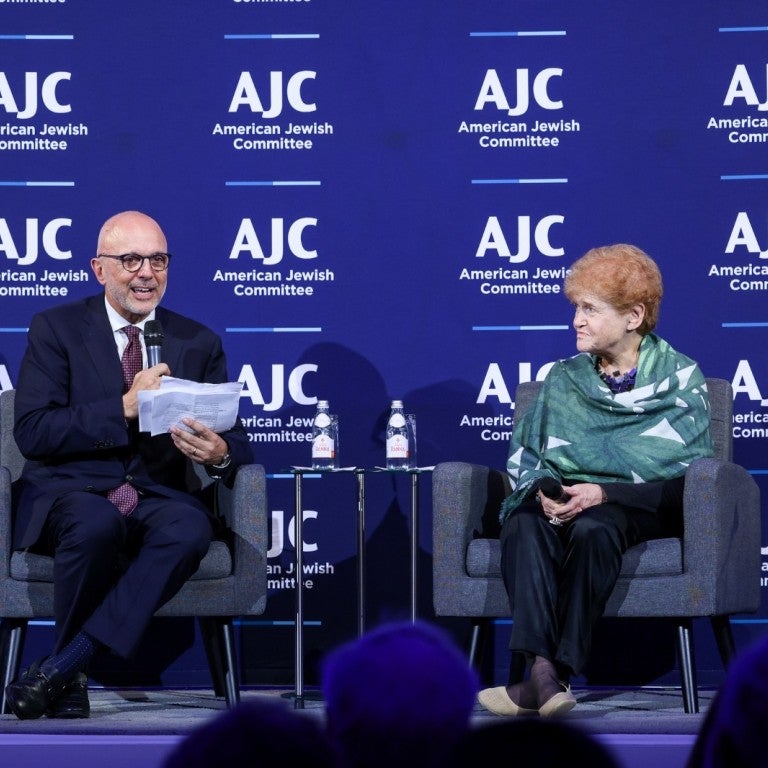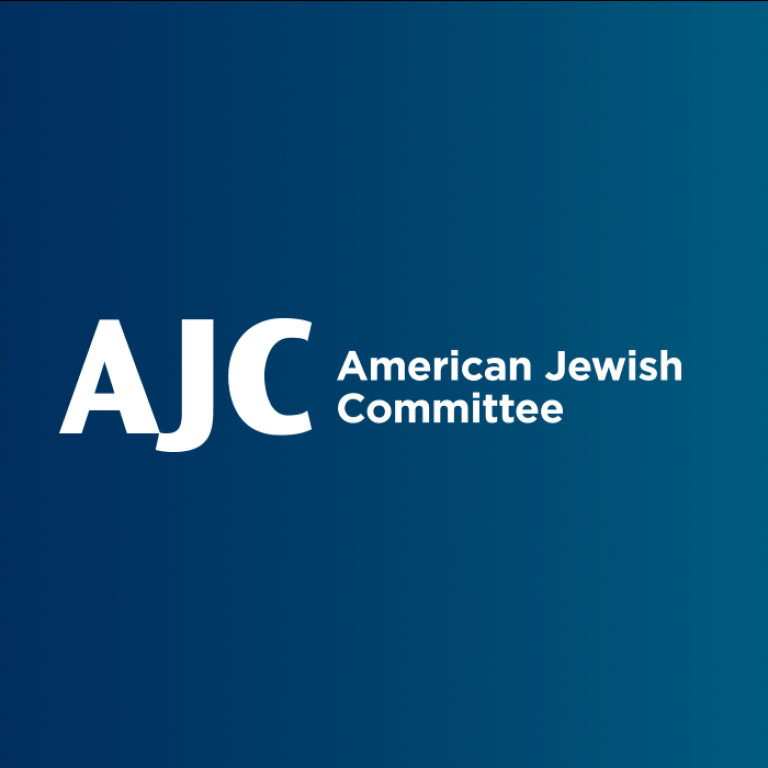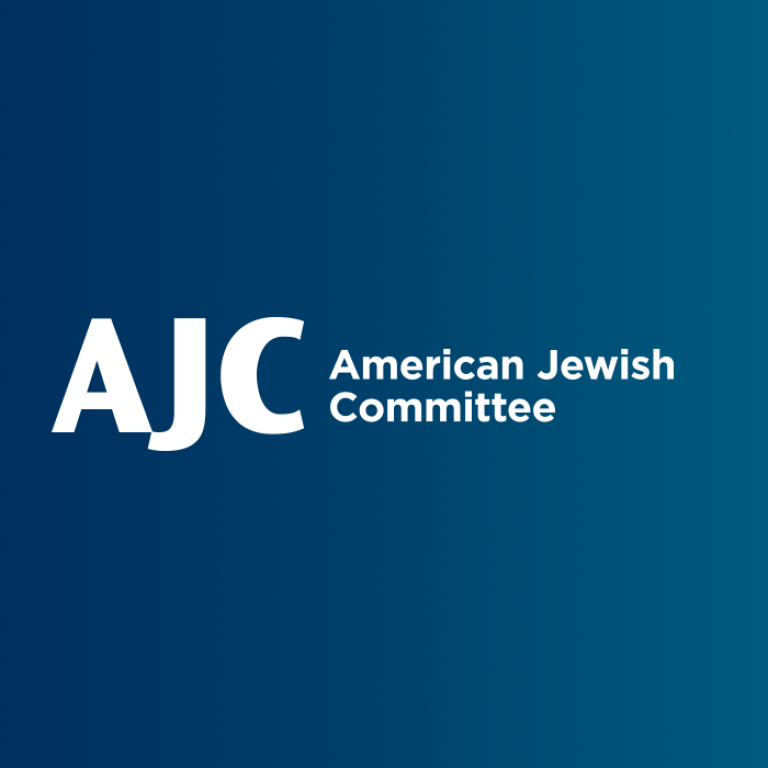September 14, 2023
When leaders from all 193 United Nations member states gather on Sept. 19 in New York, the spotlight will focus on the speeches given at the General Assembly Hall.
And at the same time, all week long, American Jewish Committee (AJC) experts from around the world will lead the Jewish community’s diplomatic outreach to these leaders to urge them to expand and strengthen ties with Israel, counter rising antisemitism, stop the spread of extremism, and more.
Here’s a look at five major issues we’re tracking as this year’s UN General Assembly kicks-off.
1) Advancing Peace Between Israel and its Arab Neighbors
What’s next for expanding peace: This year marks the third anniversary of the historic normalization agreements between Israel, the United Arab Emirates, Bahrain, and Morocco. As Israel and these Arab nations strengthen ties, reports indicate that other Arab nations and Muslim-majority states, including from outside the Middle East, could soon establish their own deals with the Jewish state. [Listen to AJC People of the Pod’s recent interview with U.S. Senator Joni Ernst, a member of the U.S. Senate’s Abraham Accords Caucus, discuss this very possibility.]
What will your score be?
What it means for Palestinians: Progress between Israel and its Arab neighbors does not depend on, nor should it be a substitute for, an Israeli-Palestinian agreement. In fact, while benefiting hundreds of millions of inhabitants of the Middle East and North Africa, broader peace will help create an environment more conducive to reaching such an agreement.
The state of play: Palestinian Authority (PA) President Mahmoud Abbas has recently come under withering criticism for once again spreading vile antisemitic lies. In a recent speech, he echoed assertions from his doctoral dissertation blaming Jews for the Holocaust and defending Hitler's motivation in murdering six million Jews. Abbas’s comments came amid one of the worst outbreaks of terrorism since the Second Intifada in the early 2000s.
Background: Last year, in a history-making speech to the UN General Assembly, then-Israeli Prime Minister Yair Lapid took a significant step in endorsing a two-state solution while cautioning that a future Palestinian state must not be “another terror base.” Current Israeli Prime Minister Benjamin Netanyahu has signaled he is open to negotiations with the Palestinians and is willing to cooperate with them on security matters.
What AJC is doing:
- AJC is urging other Arab states to join Egypt, Jordan, the UAE, Bahrain, and Morocco in establishing full diplomatic ties with Israel.
- AJC is urging all nations to follow the lead of the U.S., EU, France, and Germany in condemning the Palestinian leader’s remarks.
- AJC is reiterating its long-held stance that a durable two-state solution is the only realistic resolution to the Israeli-Palestinian conflict, and if it is to be achieved, it must be established through direct bilateral negotiations between the parties themselves.
2) Combating Rising Antisemitism
After the U.S. released its unprecedented National Strategy to Counter Antisemitism in May of 2023, the UN was expected to follow suit.But a conference in Spain to do just that was postponed amid criticism of the UN’s draft plan.
What the UN has done to address rising antisemitism: In 2019, a historic UN report on global antisemitism was published by the Special Rapporteur on freedom of religion or belief, Dr. Ahmed Shaheed. It was the first-ever stand-alone human rights report dedicated solely to antisemitism and it recommended that all member States adopt the IHRA Working Definition of Antisemitism. Dr. Shaheed, as the UN’s Special Rapporteur, released in 2022 an Action Plan to Combat Antisemitism. In early 2023, the UN General Assembly passed a resolution condemning condemning denial of the Holocaust and urging all nations and social media companies “to take active measures to combat antisemitism and Holocaust denial or distortion.”
The UN’s antisemitism problem: Speaking at a high-level UN event on antisemitism earlier this year, AJC CEO Ted Deutch called on the UN to do more to combat antisemitism at the world body. “It's no secret that certain bodies of the UN focus disproportionately on Israel, notwithstanding the efforts of the United States and so many of you here to change that,” said Deutch before appealing to UN leaders to do more, and particularly to assist AJC in “breaking through indifference among some diplomats and some UN personnel to what happens here sometimes in these halls.” Deutch expressed particular alarm about “insinuations that Israel itself, the world's only Jewish state, is a racist endeavor."
What AJC is doing:
- AJC is urging the UN and member countries to use the IHRA Working Definition of Antisemitism and to develop plans to counter antisemitism.
- In May 2023 AJC spearheaded a letter signed by 160 Jewish communities to show that the vast majority of Jewish communities worldwide find the IHRA definition not only helps fight antisemitism, but – as the letter affirms – “can be used entirely consistently."
3) Israel on the Global Stage
Background: After being out of office during the last two UNGA sessions, Israeli Prime Minister Benjamin Netanyahu will return to New York in 2023. Netanyahu, who once served as Israel’s ambassador to the UN during the 1980s, has a colorful history at the UNGA, most notably in 2012, when he used a cartoon of a nuclear bomb to illustrate the threat of Iran’s nuclear program.
Key speech: It is expected that Netanyahu will continue to highlight the Iranian threat, including its support for terror groups to attack Israel. Other key issues to watch during Netanyahu’s speech include Israel’s effort to expand peace with its Arab neighbors, confronting global antisemitism, and Israel’s expanding ties with countries in Africa, Latin America, and Asia.
Key meetings: After months of speculation about the venue, Netanyahu is also expected to meet with U.S. President Joe Biden on the sidelines of the UNGA, the first meeting of the two leaders since Netanyahu returned to office late last year. Several high-stakes issues will be at play during their meeting, such as how to deal with the Iranian nuclear threat, the recent deal to free Americans held hostage in Iran, expanding the Abraham Accords, and judicial reform in Israel.
Netanyahu will also meet with Ukrainian President Volodymyr Zelensky, which will be their first in-person meeting since Netanyahu regained the premiership.
What AJC is doing:
- While Israel has continued to expand ties around the world, addressing anti-Israel bias at the UN remains a key priority. AJC encourages all governments to reject institutional discrimination and chronic one-sidedness targeting Israel at the UN, undermining its credibility.
- Following the hostilities between Israel and Hamas in May 2021, the UN Human Rights Council created a commission of inquiry with an open-ended mandate, which enables it to engage in never-ending scrutiny of Israel. AJC is calling on the Human Rights Council to disband this harmful commission.
- Last year, the UN General Assembly adopted a resolution calling on the International Court of Justice (ICJ) to render an advisory opinion on the Israeli occupation. However, the Israeli-Palestinian conflict can only be resolved through negotiations between the parties. The involvement of the ICJ in this political conflict will undermine the Court’s credibility.
4) Iran’s Multiple Threats and the World’s Reaction
Human Rights Abuses:
Iran's President Ebrahim Raisi, with a troubling human rights record, plans to address the UN amid efforts to suppress protests against the Iranian regime. Since the beginning of the 2022 nationwide protests, Iranian security forces have killed, detained, and tortured many, and UN experts have suggested these actions could amount to crimes against humanity.
What AJC is doing:
- AJC is urging the international community to consider the determination by the Special Rapporteur on Iran that the violations committed by Iranian authorities during and since the 2022 protests may constitute crimes against humanity and call for full accountability for those responsible for the violations.
- AJC is calling on governments around the world to impose Magnitsky-like targeted sanctions against additional Iranian government officials and entities that are responsible for the ongoing arbitrary arrest of and violations against women and girls, human rights defenders, and victims of the crackdown and their families. Such sanctions should not be aimed at civilians nor limit their access to food or medical supplies.
Targeting Jews and Spreading Terrorism Around the World:
Iran's status as a leading state sponsor of terrorism is gaining strength, with Israel's Mossad Director David Barnea warning of the global threat posed by Iran, having thwarted 27 attacks against Jews and Israelis abroad in the past year. Israel's Prime Minister Benjamin Netanyahu attributes ongoing terror attacks in Israel and the West Bank to Iran and its terror network.
What AJC is doing:
- AJC is urging nations to counter Iran’s Islamic Revolutionary Guards Corps (IRGC) and proxies like Hamas and Hezbollah and address the regime’s supply of advanced drones for Russia’s brutal war against Ukraine. AJC urges the EU and its member states to blacklist the IRGC.
- AJC is urging the EU to once and for all label all of Hezbollah, not just its so-called “military wing,” a terrorist organization.
Nuclear Program and Ballistic Missiles Sanctions:
In an alarming September report, the International Atomic Energy Agency (IAEA), the UN’s nuclear watchdog, reported that Iran has expanded its stock of near-weapons-grade uranium. Further, just days ahead of the UNGA session, the IAEA strongly condemned Iran's "unprecedented" decision to bar roughly one-third of the IAEA's most experienced inspectors from overseeing its nuclear sites. Meanwhile, the sanctions on Iran’s missile program are set to expire next month in October.
What AJC is doing:
- In a July letter to the UN Security Council, AJC called on the Security Council and every nation to use all available measures to constrain Iran’s domestic ballistic missile production capabilities.
5) Ukraine and Countering Russia
The background: Last year, Russia’s war of aggression against Ukraine was the main issue at the UN General Assembly. The war, which many, including AJC, see as a fight for democracy and democratic values, is now in its 19th month and Ukrainian President Volodymyr Zelensky, who addressed AJC Global Forum 2021 via video, recently told Ukrainians that they will need to learn to live with conflict like Israel does. "We are reclaiming our state and it will be ours. It will happen, but we need to learn to live with it. Israel is fighting. It depends on the kind of war. We are ready to fight for a long time without losing people. It's possible. We can minimize casualties, as with the example of Israel. You can live like this," he declared to Ukrainian journalist Nataliia Moseichuk.
Where the war stands: After making a remarkable stand in defending the capital of Kyiv in the beginning stages of the war, and then recapturing significant territory in Ukraine’s northeast in late 2022, this year has been dominated by Ukraine’s difficult counter-offensive against Russian-held territories in Ukraine’s south.
What’s next: Zelensky, who spoke to his fellow leaders remotely in 2022, is set to appear in New York in person to address the General Assembly. The Ukrainian leader is likely to endorse a special tribunal that could hold Russian leaders, including President Vladimir Putin, accountable for crimes of aggression. Zelensky is also likely to appeal to nations in the Global South, who have been particularly impacted by Russia’s decision to pull out of the Black Sea grain deal.
What AJC is doing:
- Since the start of the war, AJC, in addition to raising millions of dollars for humanitarian relief efforts for Ukrainians, has successfully advocated for crippling sanctions against Russia, and increased security, military, economic, and humanitarian assistance for Ukraine and Central European partners. The UN General Assembly has adopted six AJC-supported resolutions condemning Russia’s aggression and demanding its withdrawal from Ukraine.
- The UN Human Rights Council has created, with AJC’s urging, an independent international commission of inquiry on Ukraine, which has already determined that Russia is responsible for war crimes, including “willful killing, unlawful confinement, torture, rape, and other sexual violence, unlawful deportation of political prisoners and children.”Going forward, AJC is urging countries to block Russia’s bid for membership in the UN Human Rights Council.





